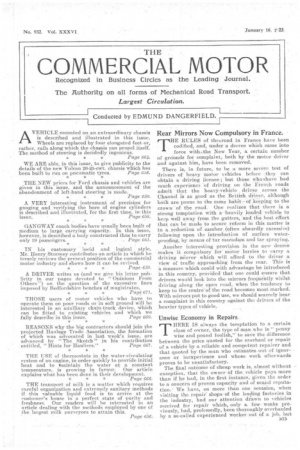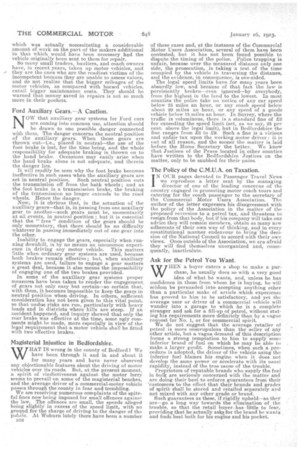Rear Mirrors Now Compulsory in France. •
Page 1

Page 2

If you've noticed an error in this article please click here to report it so we can fix it.
THE RULES of theiroad in France have been ' . codified, and, under a decree which came into force with,the New Year, a certain number of gro-unds for complaint, both by the motor driver and against him, have been removed.
There is, in future, to he a more severe test of drivers of heavy motor vehicles before they can obtain a driving licence ; but these Whoahave had much experience of driving on the trench roads admit that the heavy-vehicle . driver . across the Channel is as good as the British, driver, although bath are prone to the Same habit"--of :keeping to the crown • of the road. One realizes that there is a strong temptation with a-heavily loaded -vehicle to key well away from the gutters, and the hest effort that can be made to secure reform in this matter is in a_reduction of camber_.(often absurdly excessive) following upon the introduction of surface waterproofing, by means of tar macadam and tar spraying.
Another interesting provision in the new decree makes i it compulsory for motor lorries to carry a driving mirror .which will afford to the driver a view of traffic approaching from the rear. This is "a measure which could with advantage be introduced in this country, provided that one .could ensure that drivers would look into the mirrors frequently whilst driving along the open road, when the tendency to keep to the centre 'of-the road becomes most marked. With mirrors put to good use, we should scarcely hear a complaint in this country against the drivers of the heavier types of vehicle. .
Unwise Economy in Repairs.
THERE IS always. the temptation to a certain class of owner, the type of man-who is" penny wise and pound foolish," to save the difference between the price quoted for the o.verhaul or repair of a vehicle' by a reliable and competent repairer and that quoted by the man who estimates out of ignorance or inexperience and whose work afterwards proves to be unsatisfactory. The final outcome of cheap work is, almost without exception, that the owner of the, vehicle pays more than if he had, in the first instance, *given the order to 'á concern of proven eap.a.ejty and of sound reputation.' We have, on more than one occasion, when visiting the repair' hopsof the leading factories in the industry, had our attention "drawn to vehicles received for repair which, only a fewweeks previously, had, professedly, been thoroughly overhauled by a so-called experienced -werker.out of a job, hut which was actually necessitating a considerable amount of work on the part of the makers additional to that which, would have been necessary had the vehicle originally been sent to them for repair.
So many small traders, hauliers, and coach owners have, in recent years, taken up motor vehicles, and they are the ones who are the readiest victims of the incompetent because they are unable to assess values, and do not realize that the bigger mileages of the motor vehicles, as compared with horsed vehicles, entail bigger maintenance costs. They should be warned that money saved in repairs is not so much more in their pockets.
Ford Auxiliary Gears,----A Caution.
NOW that auxiliary gear systems for Ford cars are coming into common use, attention should be drawn to one possible danger connected Avith them. The danger concerns the neutral position of the auxiliary gears. When those gears are thrown out—i.e., placed in neutral—the use of the foot brake is lost, for the time being, and the whole responsibility for adequate braking is thrown on to the hand brake. Occasions may easily arise when the hand brake alone is not adequate, and therein the danger lies.
It will readily be seen why the foot brake becomes ineffective in such cases when the auxiliary gears are set in neutral position. Such neutral position cuts the transmission off from the babk wheels; andas the foot brake is a transmission brake, the braking of the transmission no longer extends to the road wheels. Hence the danger. Now, it is obvious that, in the actuation of the auxiliary gears—that is, in passing from one auxiliary gear to another—such gears must be, momentarily at all events, in neutral position ; but it is essential that the " free " condition of the gears should he only momentary, that there should be no difficulty whatever in passing immediately out of one gear into the other.
Inability to engage the gears, especially when running downhill, is by no means an uncommon experience in driving any motor vehicle. This matters little when ordinary gear systems are used, because both brakes remain effective; but, when auxiliary systems are used, failure to engage a sear matters a, great deal, because it also means the impossibility of engaging one of the two brakes provided.
In some of the auxiliary gear systems proper measures have been taken to render the engagement. of gears not only easy but certain—so certain that, with them, it becomes impossible to keep the gears in neutral position when driving. In others, sufficient consideration has not been given to this vital point, so that undue risks are rim, particularly with heavy loads and in districts where hills are steep. If an accident happened, and inquiry showed that only the rear brake was effective at the time, some ugly comments might be made, more especially in view of the legal requirement that a motor vehicle shalt be fitted with two effective brakes.
Magisterial Injustice in Bedfordshire.
WHAT IS wrong in the county of Bedford'? We have been through it and in and about it for many years and have never observed any objectionable features about the driving of motor vehicles over its roads, But, at the present moment, a spirit of vindictiveness against the motor lorry seems to prevail on some of the magisterial benches, and the average driver of a commercial-motor vehicle passes through the county in fear and trembling.
We are receiving numerous complaints of the spiteful fines now being imposed for small offences against the law. The offences are small, the speeds alleged being slightly in excess of the speed limit, with no ground for the charge of driving to the danger of the public. At Woburn lately there have been a number n16 of these cases and, at the instance of the Commercial Motor Users Association, several of them have been contested, but it has not been found possible to dispute the timing of the police. Police trapping is unfair, because over the measured distance only one side, the prosecution, is taking a test of the time occupied by the vehicle in traversing the distance, and the evidence, in consequence, is one-sided.
The legal speed limits have for many years been absurdly low, and because of that fact the law is persistently broken—even ignored—by everybody, from the highest in the land to the lowest. In most counties the police take no notice of any car speed below 25 miles an hour, or. any coach speed below about 20 miles an hour, or any speed of a goods vehicle below 15 miles an hour. In Surrey, where the traffic is voluminous, there is a standard fineof 2 for exceeding the speed limit (set, as we say, 25 per cent. above the legal limit), but in Bedfordshire the fine ranges from 26 to 29. Such a fine is a vicious and unfair tax upon the working motor driver: it is out of all reason, and the sooner the matter is laid _before the Horne Secretary the better. We know that Justices of the Peace located in other counties have written to the Bedfordshire Justices on the matter, only to be snubbed for their pains.
The Policy of the C.M.U.A. on Taxation.
IN OUR pages devoted to Passenger Travel News we reproduce a, letter sent by the managing director of one of the leading concerns of the country engaged in promoting motor coach tours and catering for the coach passenger to the secretary of the Commercial Motor Users Association. Vile author of the letter expresses his disagreement with the policy of the Association in the matter of the proposed reversion to a petrol tax, and threatens to resign from that body, but if his company will take our advice they will remain members, obtain as many new adherents of their own way of thinking, and in every constitutional manlier endeavour to bring the decision of the National Council to accord with their own views. Once outside of the Association, we are afraid they will find themselves unorganized and, consequently, inarticulate.
Ask for the Petrol You Want.
WHEN a buyer enters a shop to make a purchase, he usually does so with a very good idea of what he wants, and, unless he has , confidence in those from whom he is buying, he will seldom be persuaded into, accepting anything other than a particular make of article which experience has proved to him to be satisfactory, and yet the average user or driver of a commercial vehicle will wander into a garage to which he is a complete stranger and ask for a. fill-up of petrol, without stating his requirements more definitely than by a vague request for No. 1, or for commercial spirit.
We do not suggest that, the average retailer of petrol is more unscrupulous than the seller of any other article, but a, vague demand of this description forms a strong temptation to him to supply some inferior brand of fuel on which he may be able to make a larger profit. Sometimes, when such a procedure is adopted, the driver of the vehicle using the inferior fuel blames his engine when it does not develop the same power or accelerate with its usual rapidity, instead of the true cause of the trouble. Proprietors of reputable brands who supply the fuel in bulk ere seriously concerned with the matter and are doing their best to enforce guarantees from their customers to the effect that their brands and grades of spirit shall be stored and •retailed separately and not mixed with any other grade or brand. Such guarantees as these, if rigidly upheld—as they are—go a long way towards the elimination of the trouble, so that the retail buyer has little to fear, providing that he actually asks for the brand he wants and finds best both for his engine and his pocket.






























